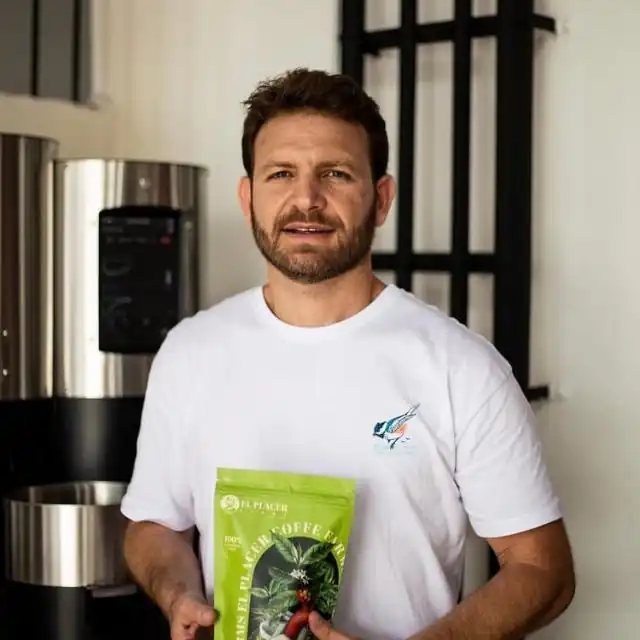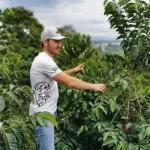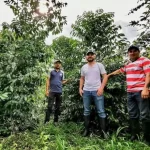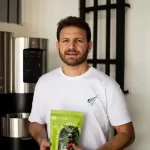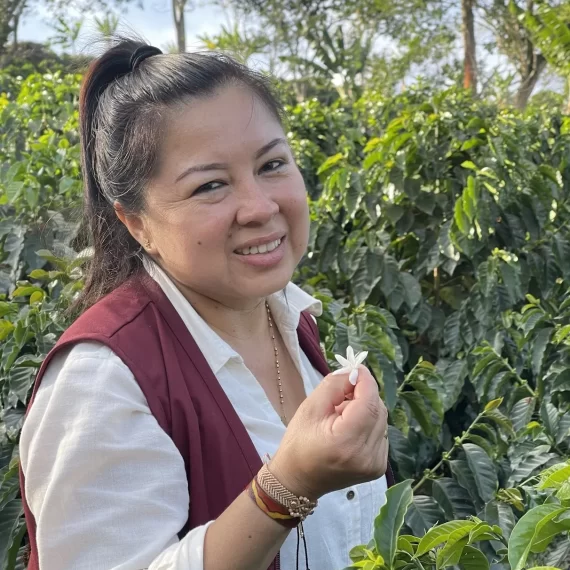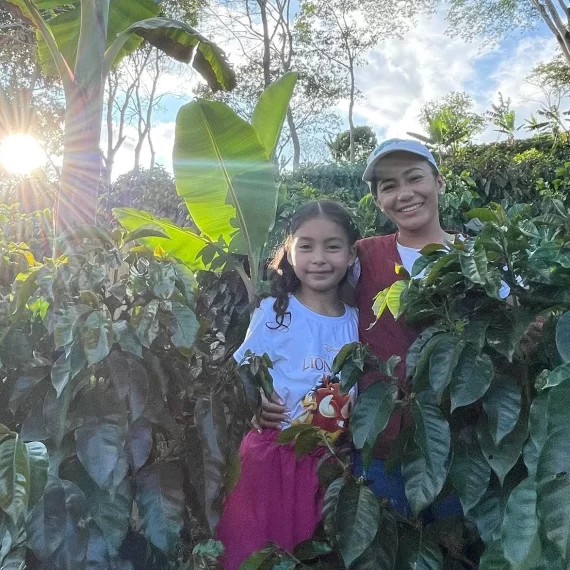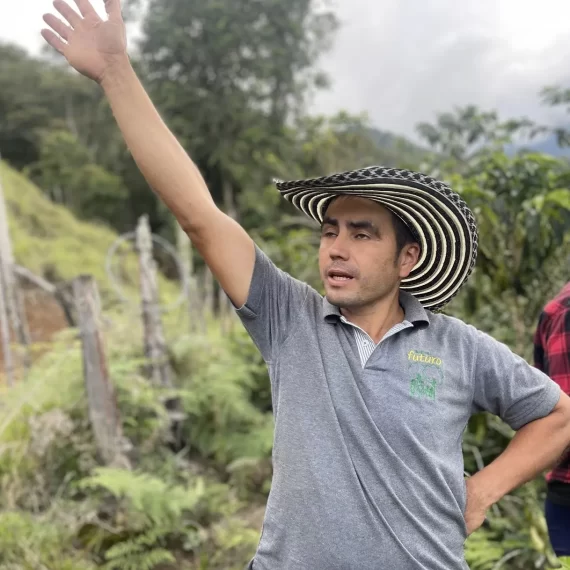Coffee processing: hand-picked, only ripe cherries are hand-picked from the tree. The selection is continued by immersing the whole cherries in tanks of water and removing the floating beans called flotes. This ensures that only the best cherries undergo the fermentation process. Finally, the coffee cherries are still sorted by hand to ensure the best selection of coffee. At the beginning of each process, the cherries are sealed in 200-liter plastic containers filled with CO2, carbon dioxide. Thanks to the CO2, the cherries are carbonically macerated in the plastic containers.

El Placer Farms – Sebastián Ramiréz
The Finca El Placer farm is owned by Sebastián Ramiréz, a fourth generation coffee farmer. He has been running the family farm for more than ten years. Sebastián uses dry, washed and semi-washed coffee processes and all varieties undergo carbonic maceration. He tries to minimize water consumption on the farm, so conventional washed processes are being abandoned. In his quest to maximize the flavor potential of each variety, Sebastián takes it a step further by trying to preserve as much of the coffee cherry as possible during fermentation.
Farma El Placer means „pleasure“, an apt name for Sebastián’s coffees and his experimental processing methods. The farm is located in the Quindío region at an altitude of 1500 to 1744 meters above sea level.
ABOUT THE PROCESSES
“At the beginning of each process, the cherries are sealed in 200-liter plastic containers filled with CO2, carbon dioxide.”
The processing phase of the honey method can take several hours. In the first step, the cherries are partially crushed, leaving a juicy pulp. This is followed by carbonic maceration in plastic tanks. The coffee is then partially washed and carbonic macerated again. During fermentation, the pH level and temperature are carefully monitored. Finally, the coffee is dried on African beds called Marquesinas. The drying process takes up to 30 days or until the coffee reaches the desired moisture content of between 10 % and 12 %.
The dry or natural process is a one-off fermentation process that can take up to 700 hours depending on the desired flavor and overall coffee profile Sebastian wants to achieve. The coffee is fermented in its own pulp. It is then dried, as with the other processes, for 30 days. This is followed by dehulling and proper storage of the coffee in jute bags to stabilize the flavors.
Harvesting and sorting of cherries by processed fermentations with maracuja in five steps:
-
- Hand-picking of the cherries (95 % ripe, 5 % semi-ripe).
- Anaerobic fermentation in 200-liter tanks for 120 hours at a constant temperature of 18 °C + wine yeast.
- The coffee is then dehulled and the carbonic maceration continues for 72 hours, as carbon dioxide is injected.
- At this stage the dehydrated fruit maracuja + fruit glucose enters the tanks.
- This is followed by a check when the coffee is dried at 40 °C in a dryer. The drying phase takes place over a period of approximately 5 days. All drying is slow and controlled. The final stage is bagging and stabilization of the coffee, which takes approximately 15 days.
Harvesting and grading of Castillo cherries by processed fermentation with dark grapes in five steps:
-
- Hand-picking of the cherries (95 % ripe, 5 % semi-ripe).
- Anaerobic fermentation in 200-liter tanks for 120 hours at a constant temperature of 18 °C + wine yeast.
- The coffee is then dehulled and the carbonic maceration continues for 72 hours, as carbon dioxide is injected.
- At this stage the dehydrated fruit dark grapes + fruit glucose enters the tanks.
- This is followed by a check when the coffee is dried at 40 °C in a dryer. The drying phase takes place over a period of approximately 5 days. All drying is slow and controlled. The final stage is bagging and stabilization of the coffee, which takes approximately 15 days.
Harvesting and grading of Castillo cherries by processed fermentation with strawberries and cranberries in five steps:
-
- Hand-picking of the cherries (95 % ripe, 5 % semi-ripe).
- Anaerobic fermentation in 200-liter tanks for 120 hours at a constant temperature of 18 °C + wine yeast.
- The coffee is then dehulled and the carbonic maceration continues for 72 hours, as carbon dioxide is injected.
- At this stage the dehydrated fruit strawberries and cranberries + fruit glucose enters the tanks.
- This is followed by a check when the coffee is dried at 40 °C in a dryer. The drying phase takes place over a period of approximately 5 days. All drying is slow and controlled. The final stage is bagging and stabilization of the coffee, which takes approximately 15 days.
Harvesting and sorting of Caturra – Orange fruit cherries:
1) Harvesting and sorting of cherries (95% ripe, 5% semi-ripe).
2) Anaerobic fermentation in 200 litre tanks for 120 hours at a constant temperature of 18 °C with CO2 injection and the addition of wine yeasts
3) Cleaning the coffee from the skin followed by anaerobic fermentation for 72 hours with CO2 injection + addition of dehydrated peaches with glucose – monitor the PH in the tank.
4) The first stage is the drying process in which the drying of the coffee is checked at 40 °C and 25% humidity for approximately 15 days.
5) The second stage of drying takes place in the shade of the tree canopy for approximately 5 days. All the drying stages are slow and controlled.
6) Stabilisation of the grain. The coffee waits for 15 days in GrainPro bags to stabilise its flavours.
Harvesting and sorting Pink Bourbon cherries – Lychee
1) Harvesting and sorting of cherries (95% ripe, 5% semi-ripe).
2) Anaerobic fermentation in 200 litre tanks for 168 hours at a constant temperature of 18 °C with CO2 injection, during which carbon dioxide is injected into the tanks to displace all the air and allow fermentation to continue in a controlled manner without raising the temperature in the tanks.
3) At this stage of the fermentation, the pulp is also added to the tanks and ‚inoculated‘ with lactic acid.
Isolation of micro-organisms from lemon grass.
4) The first stage is drying, during which the coffee is controlled at 40 °C and 25 % humidity for approximately 20 days. The second stage of drying takes place in the shade of the tree canopy for approximately 5 days. All the drying stages are slow and controlled.
5) Stabilisation of the grain. The coffee waits for 15 days in GrainPro bags to stabilise its flavours.
Harvesting and sorting Pink Bourbon cherries – IPA:
- Harvesting and sorting of cherries (95% ripe, 5% semi-ripe).
- Anaerobic fermentation in 200 litre tanks for 100 hours at a constant temperature of 18 °C with CO2 injection, during which carbon dioxide is injected into the tanks to displace all the air and allow fermentation to continue in a controlled manner without raising the temperature in the tanks.
- At this stage of the fermentation, the pulp is also added to the tanks and ‚inoculated‘ with lactic acid.
- The coffee is cleaned of the husk and added to the tanks with the hop-inoculated pulp, where it is fermented for a further 100 hours (again with carbonic maceration)
- The first stage is drying, during which the coffee is controlled to dry at 40 °C and 25 % humidity for approximately 20 days. The second stage of drying takes place in the shade of the tree canopy for approximately 5 days. All the drying stages are slow and controlled.
- Stabilisation of the grain. The coffee waits for 15 days in GrainPro bags to stabilise its flavours.
Harvesting and sorting Pink Bourbon – Cinnamon cherries
- Harvesting and sorting of cherries (95% ripe, 5% semi-ripe).
Anaerobic fermentation in 200 litre tanks for 120 hours at a constant temperature of 18 °C with CO2 injection - The coffee is ground and fermented for a further 120 hours in dry fermentation with cinnamon chips.
- The first stage is drying, during which the drying of the coffee is controlled at 40 °C and 25 % humidity for approximately 15 days. The second stage of drying takes place in the shade of the tree canopy for approximately 5 days.
- All the drying stages are slow and controlled.
Harvesting and sorting Wush wush natural cherries:
1) Harvesting and sorting of cherries (95% ripe, 5% semi-ripe).
2) Anaerobic fermentation in 200 litre tanks for 280 hours at a constant temperature of 18 °C with CO2 injection and the use of ‚mostto‘ (i.e. inoculated pulp)
3) The first stage is the drying stage, during which the drying of the coffee is checked at 40 °C and 25 % humidity for approximately 15 days. The second stage of drying takes place in the shade of the tree canopy for approximately 5 days. All the drying stages are slow and controlled.
4) Stabilisation of the grain. The coffee waits for 15 days in GrainPro bags to stabilise its flavours.
Harvesting and sorting Gesha cherries in five steps:
- Harvesting and sorting of cherries (95% ripe, 5% semi-ripe).
- Anaerobic carbonic fermentation in 200-liter tanks for 100 hours at a constant temperature of 18 °C, during which carbon dioxide is injected into the tanks to displace all the air so that fermentation can continue in a controlled manner without raising the temperature in the tanks.At this stage of the fermentation, the pulp is also added to the Gesha tanks and inoculated with lactic acid.
- The first stage is the drying stage, during which the coffee is dried at a temperature of 40 °C and a humidity of 25 % for approximately 20 days. The second stage of drying takes place in the shade of the tree canopy for approximately 5 days. All the drying stages are slow and controlled.
- Stabilization of the grain. The coffee waits for 15 days in GrainPro bags to stabilize its flavors.
The process of the Caturra Decaf variety
- We start by harvesting and sorting the coffee cherries, focusing on quality with 90% ripe cherries and 10% semi-ripe cherries.
- The cherries are crushed on the same day they are picked to guarantee maximum freshness.
- The coffee is fermented in traditional vats for 24 to 36 hours and then washed three times to remove any remaining impurities.
- The drying phase takes place in a tarp for 15 days with slow and controlled drying.
- The coffee is packed in Grain-Pro bags and left to stabilise for 15 days.
- Finally, the coffee is electronically hulled and graded to ensure that only the best beans make it into your cup.
- It is sent to the decaffeination process plant in Maniza.
The process of the Pink Bourbon variety
Step 1: Harvesting and Sorting
We begin by carefully harvesting and sorting the cherries, ensuring 95% are fully ripe and 5% are semi-ripe.
Step 2: Anaerobic Fermentation
The cherries undergo anaerobic fermentation in 200-liter tanks for 120 hours at a constant temperature of 18°C, with controlled CO₂ injection to create an oxygen-free environment, enhancing the flavors.
After pulping, the coffee goes through a second fermentation phase for another 120 hours. During this phase, the beans are submerged in water and undergo a thermal shock at 40°C, enriched with wild berries. This thermal shock technique helps lock in unique flavor compounds from the berries, adding complexity to the coffee profile.
Step 3: Drying Phases
First Phase: The coffee is dried under a canopy at 40°C with 25% humidity for about 20 days. This slow drying process under controlled conditions helps retain the coffee’s aromatic properties.
Second Phase: Additional drying occurs in a parabolic dryer for approximately 5 days. This stage is also controlled with shade cloth to prevent over-drying and ensure a uniform moisture level in the beans.
Step 4: Packaging and Stabilization
After drying, the coffee is packed in Grain-Pro bags and allowed to stabilize for 15 days. This stabilization period helps the beans reach a balanced state, enhancing flavor consistency.
Step 5: Hulling and Manual Selection
Finally, the coffee is hulled to remove the parchment layer and then manually selected to ensure quality. The selected beans are then vacuum-packed to preserve freshness until they reach their destination.


